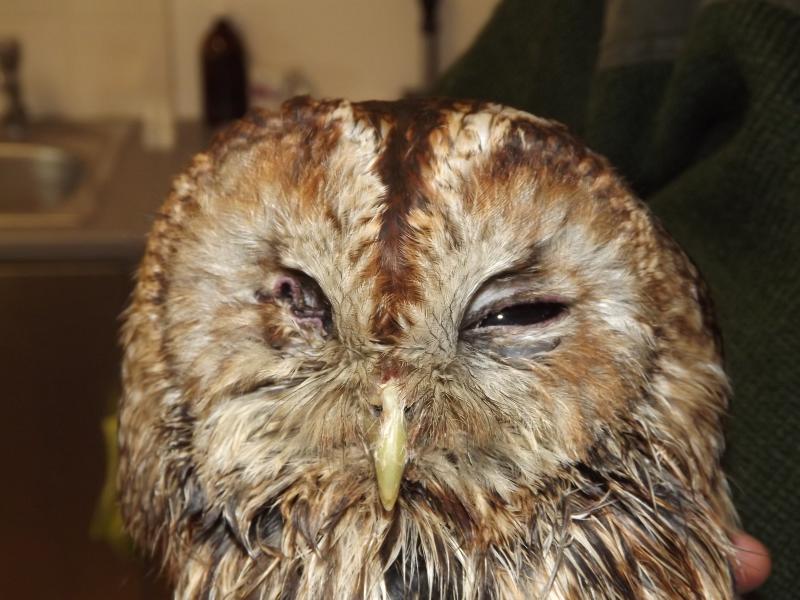Here at S.O.S., injured or traumatised owls and a variety of other birds of prey including falcons, buzzards and kestrels are brought into us for treatment on almost a daily basis. Nearly always the intention to bring it in to us is well meaning but attempts to administer first aid beforehand and the delay this causes can prove fatal - it’s often not appreciated that in order to give each bird the best possible opportunity of life, speed is of the essence. Whenever possible, we strongly recommend bringing the creature to us as soon as you can.
The reason is that often the full extent of the problem may not be immediately evident. In the case of the Tawny Owl above suffering damage to the eye, the need for speed is obvious. But in many case the reasons for the incapacity may be hidden. Though the bird may be quiet and still and allow you to handle it, there will be reasons for it: a bird of prey in good health is unlikely to let you get near it.
If it is still, the bird may be weak and suffering from malnutrition. It may be dehydrated. The cause of its distress may a hidden injury or symptoms of a debilitating disease. In such cases, resisting the temptation to keep it for a while and maybe try to feed it or apply first aid, may cost the bird its life.
Therefore, please make every effort to get the creature into us as soon as you can. Here at Suffolk Owl Sanctuary it will be given expert attention using specialised first aid equipment and critical care formula, will have access to experienced veterinary care and we also keep a good store of TLC on hand to help the bird ‘make it through’ wherever possible. We are on hand to give advice during the waking hours on 03456 807897 Option 5, and we’re open from 8.30am until 4.00pm in winter and 5.00pm in Summer.
Finally, here are the standard instructions for handling an injured bird:
Gently throw a jumper or blanket over the injured bird to gently pick it up
Put the bird into a well ventilated, darkened cardboard box - not so small that the bird will sustain further damage, but not so large that it can jump around inside. The box should preferably be lined on the bottom with another towel or, if not available, newspaper. Never use straw or sawdust and do not place water in the box. Do not cover the bird with the blanket or towel when it’s in the box for fear of it getting tangled.
Do not try to feed the bird. Get the bird to the nearest bird of prey centre as soon as possible. S.O.S. is open 7 days a week from 8.30am until 4.00pm during the winter months, and until 5.00pm in summer. For emergency advice call 03456 807 897 Option 5
Do not try to give first aid to the bird - although well-meaning, if incorrectly applied the traumatism of the wrong procedure could hasten the worst outcome.
Always wash your hands if you have touched a bird
Remember that bird of prey centres and raptor rescue organisations like S.O.S. are there to deal with birds of prey. If you’re not local to us in mid-Suffolk see this list to find one near you. Contact the RSPCA about other types of injured bird, or take it to a vet.

